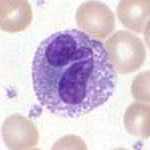
Photo from wikipedia
Objectives: To examine the effects and mechanisms of human neutrophil peptides in systemic infection and noninfectious inflammatory lung injury. Design: Prospective experimental study. Setting: University hospital-based research laboratory. Subjects: In… Click to show full abstract
Objectives: To examine the effects and mechanisms of human neutrophil peptides in systemic infection and noninfectious inflammatory lung injury. Design: Prospective experimental study. Setting: University hospital-based research laboratory. Subjects: In vitro human cells and in vivo mouse models. Interventions: Wild-type (Friend virus B-type) and conditional leukocyte human neutrophil peptides transgenic mice were subjected to either sepsis induced by cecal ligation and puncture or acute lung injury by intratracheal instillation of hydrochloric acid followed by mechanical ventilation. Using human neutrophil peptides as bait, the basal cell adhesion molecule (CD239) and the purinergic P2Y purinoceptor 6 receptor were identified as the putative human neutrophil peptides receptor complex in human lung epithelial cells. Measurements and Main Results: In the cecal ligation and puncture sepsis model, Friend virus B-type mice exhibited higher systemic bacterial load, cytokine production, and lung injury than human neutrophil peptides transgenic mice. Conversely, an increased lung cytokine production was seen in Friend virus B-type mice, which was further enhanced in human neutrophil peptides transgenic mice in response to two-hit lung injury induced by hydrochloric acid and mechanical ventilation. The human neutrophil peptides–mediated inflammatory response was mediated through the basal cell adhesion molecule-P2Y purinoceptor 6 receptor signal pathway in human lung epithelial cells. Conclusions: Human neutrophil peptides are critical in host defense against infectious sepsis by their cationic antimicrobial properties but may exacerbate tissue injury when neutrophil-mediated inflammatory responses are excessive in noninfectious lung injury. Targeting the basal cell adhesion molecule/P2Y purinoceptor 6 signaling pathway may serve as a novel approach to attenuate the neutrophil-mediated inflammatory responses and injury while maintaining the antimicrobial function of human neutrophil peptides in critical illness.
Journal Title: Critical Care Medicine
Year Published: 2018
Link to full text (if available)
Share on Social Media: Sign Up to like & get
recommendations!